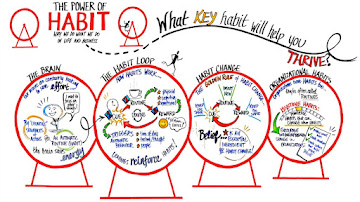In journalist, Charles Duhigg’s book The Power of Habit: Why We Do What We Do in Life and Business, he explains the foundations of the tterm “habit”. While the book is separated into 3 parts, it explains the habits of individuals, successful companies, and organizations, as well as of society. There are 3 key steps that take to create a habit and keeping that in mind it could benefit a person whether it be an internal or external profit. Once these steps are remembered and properly understood, they can be of great value. The first step of the habit loop is the cue, which is when a person decides to take an action or has been pushed to take action through external measures. The second step is the routine, in which a behavior must cycle through to influence the course of action. The last step is the reward, similar to its name, which is the end goal of the action that makes it valuable. Once these steps are established at a good consistency, it will be easier to form the habit and become accustomed to our brains.
While reading the text, the part that really stood out to me was the story of Lisa Allen, a participant in the research on how habits appear on a neurological level. Her life consisted of smoking, drinking, debt, and struggles with obesity. She was processing her divorce as her husband was cheating on her with another woman. She shares her five stages of grief in an empathetic manner which forced me to be hooked on not only her story but the book itself. She changes her life in such a manner that 4 years after her divorce, she became a whole new person. She had quit smoking and drinking, was out of debt as she had been working consistently for over 3 years, and had lost 60 pounds. At 34 years old, she decided to change her life completely and accomplished her goal. Her story reminds me of the self-control topic of our class. Self-control is learning to resist certain temptations and impulsive choices.
According to Howard Rachlin, many people lack self-control as they would rather have immediate gratification than a better reward in the future. In Allen’s case, after struggling for a while she quit smoking and drinking for a greater reward in the future. Similar to Allen, many people go through major events in their lives that can cause them to go into a depressive state. With the help and knowledge of the habit loop, individuals can help to create better habits and lifestyles for themselves to get out of that state. Creating better habits could help the world become a better place to live in.
Youtube video about The Power of Habit

No comments:
Post a Comment